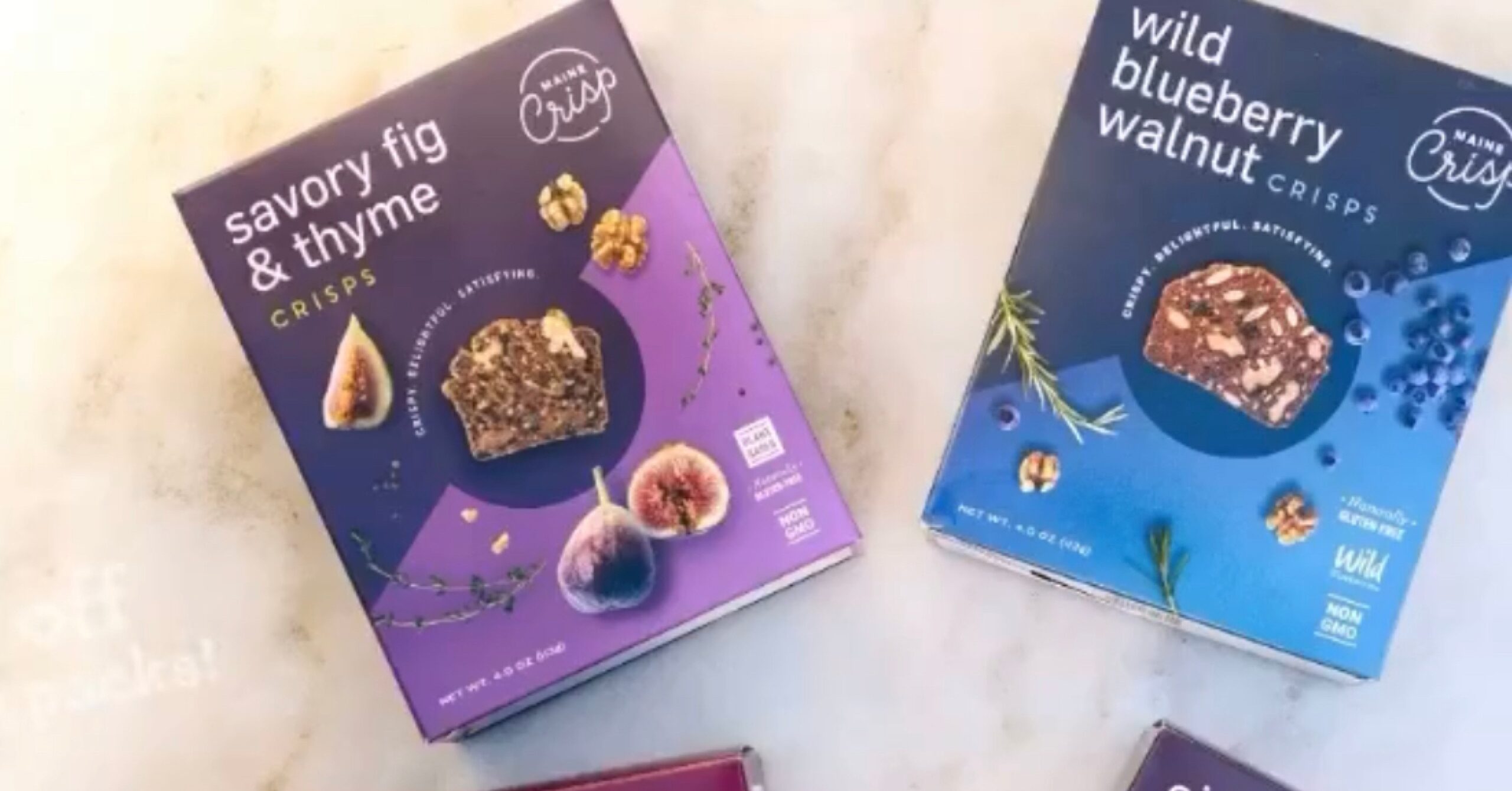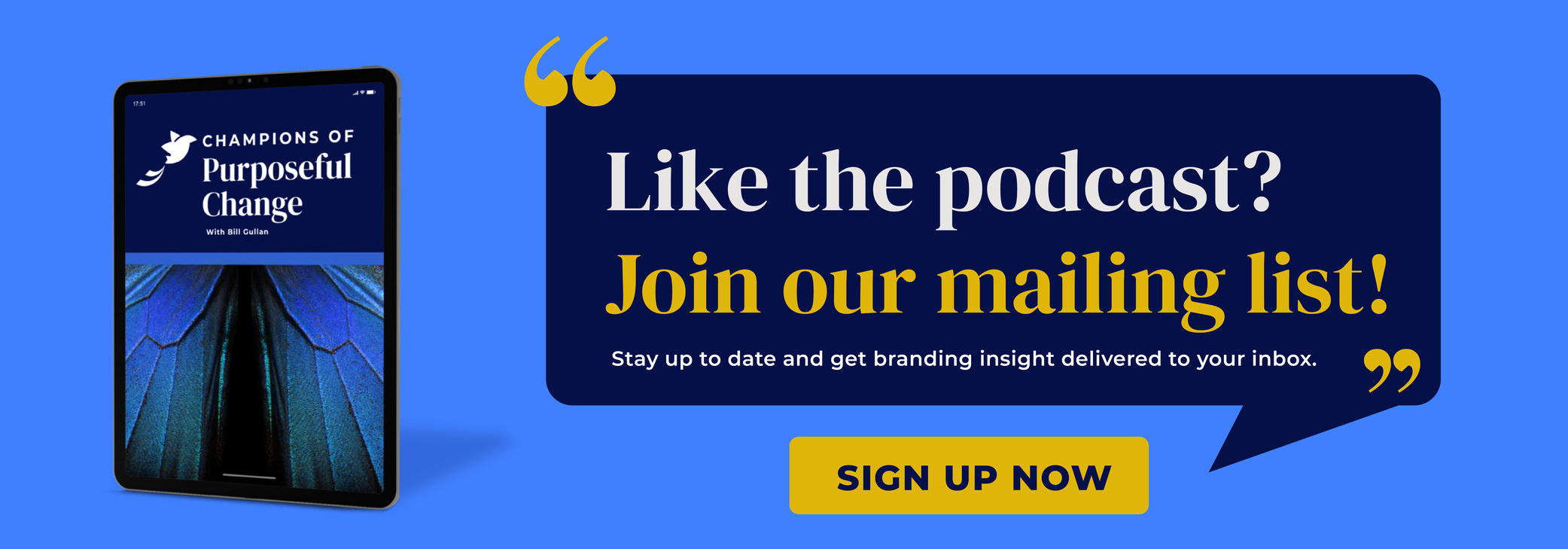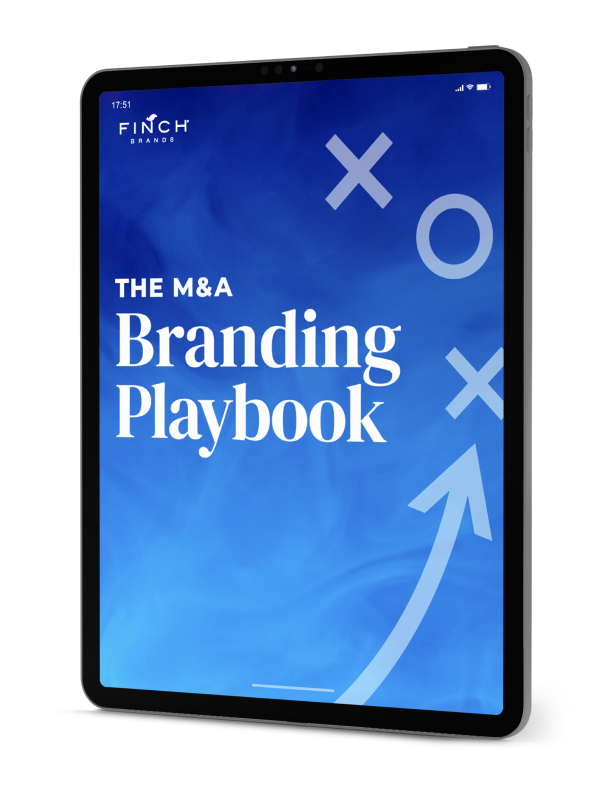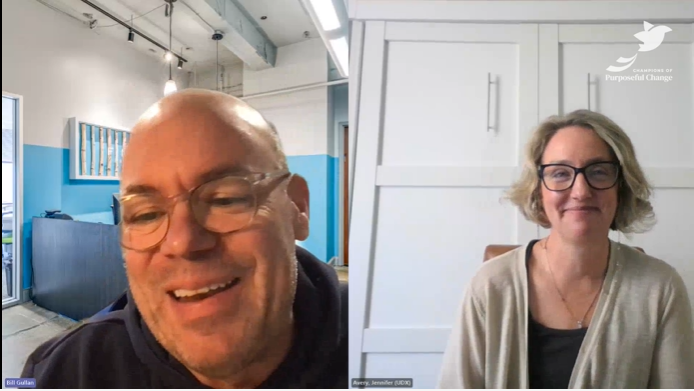Made in Good Spirit – Michael Ross and Karen Getz – Maine Crisp Co.

Today, we have TWO guests from one incredible company: Michael Ross, President & CEO and Karen Getz, Co-Founder & VP Product Development of Maine Crisp Company.
Maine Crisps are made in good spirit, from the best possible natural ingredients, responsibly farmed. We hear about Karen’s founding story – 25 years in the making – from her first sampling of buckwheat in San Jose’s Japantown, slurping down cold soba noodles, to visiting the expansive buckwheat fields of Maine’s Aroostook County. We also hear about Michael’s career journey, the Maine Crisp Co. brand, how they have weathered the storm of COVID-19, and what their plans are for 2021. If you like our podcast please subscribe!
Podcast: Download Subscribe: iTunes | RSS
Transcription:
Bill Gullan:
Greetings one at all. This is Real World Branding. I’m Bill Gullan, President of Finch Brands, a boutique brand consultancy, and we’re grateful that you’re with us today to hear the story of Maine Crisp Company. Amazing, delicious, fascinating, deep, textured. Joining us today are Michael Ross, who’s the President and CEO and Karen Getz, who’s the co-founder and VP of Product Development. And boy, these two work extremely well together, but have taken very, very different paths.
Bill:
Karen having a tremendous background in product and a passion for nutrition. And she’ll talk about all the things that inspire her as a product developer. And Michael, as a successful businessperson across finance and technology, finding a passion here to take the CEO role at Maine Crisp. The connection between the Getz Family of which four members are in the company, and Michael goes back several decades, and you can tell in their voice and hear their passion and interest and joy at building what they’re building together again at Maine Crisp Company. So enjoy hearing from Michael Ross and Karen Getz.
Bill:
We’re so pleased to be joined today by Michael Ross, who’s the President and CEO, and Karen Getz, who’s a co-founder and the Vice President of Product Development at a super cool company called Maine Crisp Company. Cannot wait for our audience to hear this story. Thanks to you both for joining us.
Karen Getz:
Thank you.
Michael Ross:
Thanks for having us, Bill.
Karen:
Good to be here.
Bill:
Total pleasure. Let’s start what we normally do and just since we’re all in different places in the interest of clear audio tracks, I’ll call on you maybe one at a time. Karen, let’s start with you. A little bit about sort of your backstory as a person and a professional, and what has led you to this opportunity and the company that you’re helping to build. And then we’ll look forward to hearing from Michael on the same topic.
Karen:
Sure, sure. So, it’s definitely a culmination of many years and a variety of experiences to get to this point. But it mostly started when our daughters were first born and they’re both about 16 months apart and I would be in the grocery store lingering, because I was shopping alone. And so, I started reading ingredients on packaging of things that I was buying. And I started taking things out of the cart going, “I not really sure what that is. I’m not sure I want to eat that.” And I know I would spend an hour in the store, but come home with hardly anything.
Karen:
And shortly after that, had moved to California and we’d spent a year in California and it was there and their whole food culture and bread culture that I really started to pay attention to food and farming, and what we were eating and reading and devouring as much as possible. And so when we came back East, it was back to we couldn’t find really great bread. You couldn’t… Buying directly from a farm wasn’t much of a thing yet, so we decided to build our own wood-fired oven and make our own bread.
Karen:
And we did that as a hobby on the side. I had homeschooled our daughters for a few years before they entered into school. And we also had like a little hobby farm in Pennsylvania. And then we decided that the farming bug had really bit us, and we decided to buy a dairy farm in Vermont and raise our daughters there. And neither one of us had that kind of background, but when you’re thrown into something that you’ve got to learn really quick.
Bill:
Yeah.
Karen:
So, learning about cows and what the cows eat and nutrition, and then starting to make cheese and experimenting with cheese and lots of notes and nuances. And then, I worked for a food co-op as a buyer, and so things coming into the store to pick, test and analyze and understand, and is something you want on the shelf of the store. So, fast forward to Maine. So I had that background experience and we were looking at moving to Maine and for my husband’s job. And we were in Northern Maine on a trip and I saw the fields of buckwheat growing and the light bulb kind of went off. It was this, I had worked at the food co-op as gluten-free was starting to become more trendy, knowing what flours were gluten-free, baking, how these flours were different from your typical wheat flour.
Karen:
And it was then that I just said, “Okay.” I, having been in food for so many years in either retail or making, I want to do it again. I want to make it again, and I want to start a food business and I’m going to make it with buckwheat and I’m going to make it with wild blueberries, which are a Maine thing, and it went from there.
Bill:
Amazing. And the stories that, at least to me, I’m a sort of sucker for stories that are about lifestyle and purpose and sort of accident and passion, as opposed to an MBA class trying to find market opportunity on a whiteboard.
Karen:
Right.
Bill:
It’s amazing. So Michael, President and CEO, I mean, you have finance in your background, you have technology in your background, a tremendous resume of business building and success. Could you talk about your journey to Maine Crisp?
Michael:
Sure. So I did come from a MBA background out of school, went to work on Wall Street for a few years, worked for Goldman Sachs doing MBA. Started working for a software company in Long Island doing acquisition work, and we acquired this product line and it came with three employees, one of which was Steve Getz, Karen’s husband.
Bill:
How about that.
Michael:
And I knew pretty quickly that this guy wasn’t going to last very long. And it was the summer of ’95 when AOL, Yahoo, bunch of dot coms were blossoming. And we started talking about starting a company and we created a cable modem software business. And we grew that from ’95 to 2000, lucky enough to sell it five months before the dot com bubble burst in May of 2000.
Bill:
Yeah.
Michael:
And at that time, I wanted to do something a little less risky, non-startup, and I bought a snack food wholesale business in Central Jersey and owned and operated that for about 14 and a half years. And we had traditional snack food items like Wise potato chips, Lance, Cape Cod, Snyder’s, and the like. And it was a very resilient, strong business, but managing independent distributors is a tough way to earn a living.
Bill:
Sure.
Michael:
So I was lucky enough to sell that to Wise Snacks in November of ’16. And I realized I was too young to work on my golf game full time and just make investments, so I was kind of looking for the next operating gig. Steve Getz And I reconnected. He told me a little bit about Karen’s product development and I was very intrigued. I have Crohn’s disease, so I’m very sensitive to better-for-you food options. And after pushing not-so-better-for-you food options for 14 and a half years, I was very intrigued by the story. But I was really reticent to do another startup because my stomach lining had just taken many years to heal and I didn’t know if I wanted to put my body under that kind of stress again.
Michael:
But as the months went by, I realized that Maine Crisp kind of checked off all the boxes for me. I’d been in the trenches with Steve, got to know Karen really well. Actually, was very connected with their children, who both daughters played a very key roles at Maine Crisp now, so it’s really a family affair. And I decided to join them in August of ’16 and it’s just been a great adventure so far. A bunch of people made the analogy, when you going to graduate with this company, graduate college? And that for us is kind of the blessed exit event when we find the right strategic partner and that’s probably three to five years from now. And we’re really having a great time, despite the challenges that 2020 is brought us.
Bill:
Yeah, definitely. And I think we’ll get to how the company is reacted to and pivoted in light of COVID. But let’s get into the sort of guts of what you all have and are building. A company was founded in 2014, but the Maine Crisp Co., Maine Crisp Company and Michael, as you said, joining a little bit later. The business today, I mean, it is primarily, Karen, you can phrase this better than I can. These are crisps that pair incredibly well with cheeses. You’ve earned a very wide distribution in the gourmet channel, as well as whole foods and some other multiunit retailers. And could you talk about, whoever wants to sort of grab onto this to start at least, how the plans for the business took shape? Why, you mentioned buckwheat, but why crisps? Why this? What makes it so distinctive and amazing, because we know that it is?
Karen:
Sure. So buckwheat is just, it’s something that I love. So, I’m a lover of Japanese soba noodles and that was one of the things, well, the girls, our daughters were young, we used to go to Philadelphia, probably, what, Michael, once a month or every other week or something?
Michael:
Yep.
Karen:
And enjoying it for Japanese for dinner and the girls loved slurping soba noodles as well. And so soba is the Japanese word for buckwheat. So I’ve always been a fan of buckwheat. Choosing it, working at a food co-op as a buyer, you’re looking at what’s on the market and what’s not on the market. And I noticed there are these really nice, seed and nut and fruit crackers, but nothing that was gluten free-
Bill:
Right.
Karen:
… that somebody could have. And then as a cheese maker, I mean, you want to pair cheese making is a tremendous amount of work. And so you want to pair that cheese with something that compliments it. And the idea is, your cheese is nice and your cracker is nice and you put them together and it becomes really nice. So I wanted to create something with nuance flavors so that they would pair with cheese, but had enough flavor that you could snack on them by themselves. You could use them for dips and things. So that’s like, just a matter of… And then using the foods that are grown here in Maine that were sort of inspired the original first two flavors and then the third flavor as well, the cinnamon maple, and it was just that experimenting. I love to experiment. I did it with bread. I did it with cheese. One of my best cheeses was one that I actually made a mistake on and it worked really well.
Bill:
Happy accident.
Karen:
It wasn’t want I wanted but wow. It was a happy accident. And so the same with this, this is just trial and error. And yes, we started, we moved to Maine in June, July of 2014, and I got started right away, just experimenting and in my home kitchen, so it was very small scale of mixing my hand, slicing these. So these are made into little loaves of bread first, and then they’d have to be sliced and re-baked, so that until they’re crisp, but similar to a biscotti process.
Karen:
So I would send out samples to friends and family and give them like this four page sensory evaluation questionnaire of like what I think, and ask them all these questions to get that feedback. But, noticing, just being aware… I love to go into the food stores and just stand there and look at the shelves and see what’s out there and look at packaging. And I love doing that and I always sometimes think somebody might think I’m shoplifting because I linger in an aisle for so long.
Bill:
This strange women.
Karen:
Yeah. It’s that sort of attention and paying attention to what’s going on in the market that I’m like, “Ah, this is something that nobody else is doing.” Most gluten-free has a basic formula of like potato starch and corn starch, and rice flour and gums, and they typically have more sugar and more salt in them. And like, why can’t we use these? There’re quite a few of [inaudible 00:13:41] flours. Why can’t we use some of these and why wouldn’t they work? What can we sort of make it better for you? So it’s not… Why couldn’t they be just as good or maybe even better than the wheat based crackers? And so that’s where I have the fun of the challenge of. And then the reward is when I’m in a store during an in-store demo, or I get an email from a customer who has celiac disease, especially.
Bill:
Yeah, right.
Karen:
Oh my goodness, thank you. This is such a treat and that keeps me going.
Bill:
That’s quite a validation. I mean, you talking about flavors, you can keep your Triscuits, people. This is savory fig and thyme. This is cranberry almond crisps, wild blueberry walnuts, cinnamon maple. These are incredible flavors from the origin and the home kitchen. Michael, on the sort of business side of the house, could you speak a little bit perhaps about the development of the company in terms of scale, in terms of e-commerce, in terms of broader distribution? What some of the ingredients have been or will be, as you all seek to grow this?
Michael:
Sure. So we’ve definitely tried to keep the core team lean and mean. And we have tried to partner with different, just strategic partners in the different disciplines of the business. So instead of having someone full time as a bookkeeper, we’re working with a company called a… Instead of bringing someone on to do PR, we’re working with a very talented young woman in the Maine area that is focusing on regional PR for us. And then we did start out with a traditional sales force. And what we realized was the name of the game for us is to scale quickly. It is a race against time to a certain extent. And we kind of turned our go-to market traditional sales force model on its head.
Michael:
Actually pretty recently, about two and a half, three months ago, parted ways with our top salespeople. And we partnered with a company called FDM Sales, Frank David Michael, and a fractional sales force that work with a select number of brands. They’re not a broker. They’re our brand development sales management company. And they have about 20 seasoned industry veterans as kind of their gunslingers, and they all come from the largest, most successful retailers across the country from Whole Foods to Publix, Albertson’s and really all of them.
Michael:
And the financial side of it is, it’s a lot less expensive for us. They’re really motivated to have success in terms of incremental sales that they’re responsible for. So that was kind of a streamlined approach on the go-to market approach that we think is key. And then when COVID occurred, it was a significant challenge because once people put our crisps in their mouth, we’re very likely to have a new customer.
Bill:
Yep.
Michael:
But when COVID came, demos went out the window and we really had to get creative. So one thing we did over the summer, we started a brand ambassador program and we hired a bunch of savvy young college kids, and they masked up and gloved up and hit specialty food stores and Whole Foods and the Wegmans of the world, and they kind of replaced those demo opportunities by kind of hands on sales. And then, like a lot of clients of yours, Bill, the direct to consumer, DTC, strategy becomes really important. So Karen’s husband, Steve, working along their daughter, Rachel, they’ve kind of expanded our DTC model. We’re going on Amazon. We’re working with a lot of online platforms like Fair. We’re doing an aggressive social media, geo-targeted social media outreach activities. We’re expanding our PR reach. So in November, even though our sales are still embryonic to a certain extent, our online sales are greater than 20%, which is a much higher margin side of our business. So we want to keep that percent really healthy as we’re going to grow 2021 and beyond.
Bill:
Excellent. Wow, that’s interesting when you talk about COVID, I mean, you have so many people are consuming at home. You have a product that’s ideal, but at the same time, relying on also distribution through retailers is challenging because people just don’t go out to these stores as much. And so it is nice to know that, even embryonically, growth in the direct to consumer channel and e-commerce is continuing to accelerate. Because I mean, this is a product for the moment if we can get it in the hands of people. COVID-wise in terms of sort of internal workings within the company, as well as some of the partners, Michael, that you outlined, so you know March happens, the world changes and how have you all pivoted in terms of work process or other elements that we may not be able to see as consumers?
Michael:
Well, I think that being as efficient as possible.
Bill:
Yeah.
Michael:
2020 was really supposed to be our breakout year. We were going to attend all the relevant trade shows. We’re not sure trade shows are ever going to come back to the extent they did in the past. So we had to keep our payroll lean and mean. And really 2020 became a year of resilience and the goal was to be on the other side of this pandemic and raising private capital in the COVID environment was not easy.
Bill:
Sure.
Michael:
But we put together a real solid list of regional angel investors in a Maine based venture capital firm. And it really just forced us to really look at every expenditure very carefully and also encourage us to work with a lot of outsource partners that I had mentioned.
Bill:
Yeah, right. Karen, this is a family affair, as noted. How, as a family business, but both before, but certainly during COVID where everyone’s kind of on top of each other, how do you all divide labor or how do you sort of think about the different compartments in your life? What’s it like to be building a business with those closest to you and how does that sort of feel day in and day out?
Karen:
Day in and day out, it feels great. I mean, I feel very fortunate and I know Steve does as well that our daughters are working with us in the business as well. And both girls, they both have two different skillsets, so they’re not really overlapping as much and that’s very helpful. So Rachel and Steve work on the marketing. Rachel works with the social media. She does all of our graphics and sell sheets and any marketing materials that we need. Claire is on the production side with me, and so she runs a staff of five on the production side. She does all the training. She works with the logistics as well and getting things shipped. And so, for us, it’s just been really nice and I feel super fortunate to have them on board and that they want to be. So we lured them over here. They were both living in Vermont and Claire came first and then Rachel came about a year later.
Bill:
Nice. Well, it’s well timed, I would imagine in the pandemic, everybody, the gravitational pull of home is strong no matter what.
Karen:
Yeah. And we have a home office as well. Everybody has a home office and then we keep it so that the core team that’s in production, they’re all masked up. We have an air exchanger in the facility that we’re in, so we can refresh the air and we’re just very aware and everybody’s a good solid team. And so we’re super happy with the group and to take care of them through this time as well.
Bill:
Yeah, amazing. What an experience, particularly this year, but generally speaking. We have a new flavor. Michael, you talked about raising private capital. We’re doing all that we can across the business to ride this out and get ready to hopefully pivot as is our entire nation and world does in 2021, more towards maybe at least some degree of normalcy. But what are some things that we should look for, e-commerce exists now so we can go by as much as we want and ride out the late stages of the pandemic. Michael, you talk about capital scale obviously matters. What are some exciting developments that are either in the works or maybe soon for the Maine Crisp Company?
Michael:
Yeah. So right now we’re in two significant retailers in New England Whole Foods in Hannafords. We’ll be going into Market Basket, which is a really high volume, excuse me, high velocity retailer, in January of ’21. But I think that our goal would be working with FDM, instead of being two, soon-to-be three retailers, we can be in dozens of retailers and hundreds, if not thousands of stores by the end of next year. Continue to focus on the e-commerce front, that’s important driver of the business, but it also is a way to kind of solidify our emotional connection with the customer. If I can circle back for a sec to the family affair.
Bill:
Sure.
Michael:
You are a branding company so I think you’ll appreciate this. We formed a very strong advisory board and actually probably one of them onto the full board and he’s a marketing expert. And from his words to our ears, he’s imploring us to really weave the guests, family affair story into the branding story.
Bill:
Yep.
Michael:
And we love our packaging and it’s probably going to be the packaging we’re going to run with until we raised the next venture capital round by July next year. But I think going forward the later part of ’21 and ’22, we don’t want to look like a National CPG company. We want people… We not only want to sell that made with family love, but also the Maine lifestyle, and it resonates with a lot of people, especially in the East coast. A lot of people vacation there. Kids go to camp there. And I think you’ll see our branding story evolve.
Michael:
And it’s interesting because the Getzes, I’ve known them now for almost three decades, they’re very humble people. So the last thing you want to do is shout to the masses, “Look at us. This has made with family love.” But from a business side, it really is something you almost have to sell because it’s part of the American dream, creating a product made with four family members. And so I just kind of essentially backed, because I think it’s interesting to probably some of your listeners.
Bill:
Yeah, definitely. The story’s rich.
Michael:
Yeah. Yeah. But I think it’s really going to much larger scale on the retailer front, growing the online business, getting it to National PR, evolving, expanding the brand strategy. And then Karen can definitely speak to some great new flavors she’s exploring.
Bill:
Yeah. A lot going on the product side, Karen, that you want to share?
Karen:
There is, yeah, absolutely. So our newest flavor, when I first made the first three flavors, they have organic milk powder in them and I didn’t think anything of it because I’m making these to pair with cheese. But I’ve come to learn that a lot of people with celiac disease cannot tolerate dairy as well. And then just in general, with the plant based craze, people have been asking for a plant-based product. So our fourth flavor is the savory fig and thyme and that is a vegan-friendly plant-based.
Karen:
And I have two other flavors that are in the works that I’ll be fine tuning over the next couple of weeks. We’re not sure which one we’re going to release first, but I believe both of those will be plant-based as well.
Bill:
Very cool.
Karen:
And we think that opens up a nice market. And we’ve been doing experimenting with some of the plant-based cheese, and they actually go really nice with the savory fig and thyme. So that’s great. And then I have some ideas for some other products and finding the time… Maybe after I get through these next two flavors that I can start doing some experimenting with a few other things I have up my sleeve.
Bill:
Oh, excellent. I can’t wait. And I was going to say, as someone with a fairly unsophisticated palate for these types of items, the fact that you helped provide me with cheese pairings and recipes, and sort of the overall sensory experience being so central to what the company is building is a tremendous service for those who maybe looking but not have as much experience as others have with these types of flavors and how to make them really, really sing and come to life the way that they were intended. It’s super, super cool.
Karen:
Yeah. And using really quality, high quality ingredients. That sort of thing is really critical.
Bill:
No doubt. And for those who, whether it’s those who have committed to a vegan lifestyle or who seek to be gluten-free either for reasons of celiac or any other reasons to have options of this sort of echelon and quality and inspiration is a tremendous service. So it’s wonderful.
Bill:
Before we let you go and thank you again so much for your time and insight. This is such an amazing story. The two of you have very different sort of professional paths that are joining up to sort of passionately advance this business, but maybe, Michael, we’ll start with you since we started with Karen originally and then we’ll end with Karen. When you think of your own journey as sort of a business person, are there words of wisdom or reflections that you have on your path that somebody who may be inspired by that path, but who was a little earlier on in their own, may want to bear in mind?
Michael:
Yeah. It’s not original, but you have to follow your passion.
Bill:
Sure.
Michael:
People spend a lot of time talking about how important hard work is, but hard work without the passion is really not going to end with great results.
Bill:
Sure.
Michael:
And for me, my dad was a lifetime Goldman Sachs banker and when I was at Goldman Sachs for just shy of three years, it became really clear to me that I wanted to be the client on the other side. And I listened to that voice, and the idea of out shining your parent in their same field, seemed a little crazy to me. And I followed my passion, which was creating stuff, creating companies, and so, do you follow your passion. And then the other key thing is you can’t build things on your own, as I’m sure you and your listeners understand. You got to find people that are equally passionate, have complimentary skillsets and the most important thing, and the Getzes are a 10 out of 10 on this front. They have to just be incredibly high integrity people.
Bill:
Yeah.
Michael:
So if you have that passion, complimentary skillsets, high integrity, I think you’re, and obviously hard work, you’re probability of success is really high.
Bill:
Yeah. Excellent. Terrific. Karen, what about you? Any words of wisdom that you’d want to share with folks who might be starting out or starting over about how to build a journey that is just fulfilling as this one?
Karen:
Sure. Yeah, and I, 100% agree with Michael on those. And I would also like to add to it that learning, always be learning. It’s one of those things that you’ll never have everything figured out. And you want to think back when making cheese, people would be like, “Oh, you can make all these cheese.” No, I can make my cheese. These four cheeses. That’s all I know how to make right now. There’re hundreds or a thousand different kinds of cheese. And so always be learning, always be open, and being adaptable. You have to be adaptable. Things are going to change. That was one thing in farming that taught us. I mean, there’s so many things out of your control, weather is a big one. And you have to be resilient. You have to keep pushing forward, even when times you feel like it’s overwhelming. You just dig deep and keep pushing forward and another door will open or another window open and always be learning, always be open to new adventures that are coming your way.
Bill:
Yeah, absolutely. Terrific and what a great place to leave it. Karen Getz, co-founder, VP product development and Michael Ross, President and CEO of Maine Crisp Company. One to watch, absolutely yummy, worth a look. Thank you so much for your time with us.
Karen:
Thank you.
Michael:
Thank you so much, Bill.
Bill:
We know this is a different kind of holiday season, but it’s a perfect season for cheese boards and pairing these wonderful cheeses with the incredible Maine Crisp product assortment, as Karen detailed. Many thanks to Michael and Karen for their time and their insight, and they’re so passionate. This company is one to watch. It is really fun, as I said in the episode to hear about the story of a business that is born from passion and interest, as opposed to just sort of market opportunity. And as Michael said, I think without sort of joy and interest, even the greatest work ethic doesn’t always lead in a purposeful direction. So, Maine Crisp Company, super cool and we’re grateful for their time.
Bill:
We are also grateful for you, our listener, helping us, if you are so inclined, and there’s a couple of ways to do that. One is to rate and review. That’ll help us get found in the app store of your choice, podcast app of your choice. Give us a rating and a review. And also to click subscribe, that button will make sure you do not miss a single episode. You don’t have to wait for our emails or our social media posts or whatever, to apprise you of the fact that we have dropped another one of these. If you click subscribe, it’ll just magically float into your device at launch, and we encourage you to do that.
Bill:
And then lastly, give us your feedback, your ideas for future guests and topics, your reflections on the work that we’re doing, ideas for how this could be a better and more valuable use of time. That’s really what we strive for. And again, our skin is very thick. We enjoy hearing that feedback and applying it as we try to be ever better moving into the new year. And so, those are the three ways. And then we’ll sign off from the Cradle of Liberty.







